Blues ReviewsApril/May2021
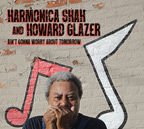 Harmonica Shah and Howard Glazer
Harmonica Shah and Howard Glazer
Ain’t Gonna Worry About Tomorrow
Electro-Fi Records
Detroit blues mainstays harpist-vocalist Harmonica Shah and guitarist Howard Glazer return with this long-awaited collaboration. They are joined by guitarist Mike Blaszkiewicz, bassists Steve Glazer and Ben Moore and drummer Skeeto Valdez. Shah and Glazer have garnered noteworthy success as a global performing act in the U.S., Europe, Australia and Canada. They’ve also enjoyed successful solo careers working with such legendary blues icons as Honeyboy Edwards, Emanuel Young, Willie “Big Eyes” Smith, Mel Brown and Jack de Keyzer.
Recorded in Detroit during the early pre-pandemic days of January 2020, Shah and Glazer entered the studio after many years to generate some vintage sounding Motor City heat. In the tradition of timeless blues pairings like Buddy Guy and Junior Wells or Muddy Waters and Jerry Portnoy, these long-time “brothers-from-other-mothers” deliver the goods. “Reality Blues (I’m Too Old to Be Your Man)” opens the album, with a straight-ahead mid-tempo shuffle. Shah’s quick, off the top-of-mind lyrics cut to the chase with a tale that straddles the generation gap. “My Bottle is My Back Account” builds off the key and energy of the first track. The veteran vocalist-harpist spins a classic yarn where money changes everything. In the song, life is honky dory as long as the money is coming in. But when it’s gone, all his “friends” are gone too. Both Shah and Glazer have stellar solo moments here. “Pretty Girl, Pretty Girl” features no drums and is somewhat haunting, with its warbly Leslie-like guitar tones. A self-effacing lyric is supported by thoughtful harmonica shadings and Blaszkiewicz’s acoustic lines. It’s a very contemplative and swampy-sounding piece. “When My Wife Comes Home” is kind of a lighthearted tune. Shah sets a scene where he’s got cable TV and invites a woman over for the weekend. But that’s because his wife is out of town. And there’s the rub! It’s a standard I-IV-V shuffle that features some great call and response from the Motor City duo. “Dirty Bastard Blues” sounds really loose and fun. The band is chugging along and hitting all their marks. But Shah is cracking up between lines in the song. That makes for a very spontaneous and live performance. In particular, Glazer really digs into his fret board, with agile string bends and fiery leads. “Somebody Loan Me a Dime” is a Fenton Robinson cover. It’s a slow blues that features one of Shah’s better vocals and some slick chicken pickin’ by Glazer. “(I Just Wanna Be) Your Floormat” has a swing and shuffle to it. The rhythm section here maintains a nice open pocket that allows the duo to play some truly inspired and inventive solos. On “Please Respect Me” Glazer digs deep, with a trebly single coil attack. Shah pleads to his woman not to be cheating in front of his face. As the song develops the harmonica man verbally directs to “give me one more solo” as Glazer obliges, with a second, grittier approach. Almost as an aside, Shah warns his woman “I’ve got plenty of ammunition, baby. I could be plenty dangerous to you and him!” The man knows how to spin a yarn, now! “She Penetrates My Mind” follows and has a backwoods juke joint feel. Again, sans drums, subtle guitars and tasty harp really demonstrate the strength and sophisticated interplay of this duo. Chester Burnett’s “Who’s Been Talking?” gets a swinging New Orleans-type treatment from the ensemble. Mean, low down lyrics are supported by a spirited and vibrant groove. The third cover in this baker’s dozen run down is a Paul Marshall piece called “So Many Roads.” It features a great vocal by Shah where he even steps into falsetto mode for a moment. This is a slow blues burner where Glazer covers a full range of tones, from horn-like to subtle nuance. “First Train South” is the sole instrumental piece on the album. It’s basically a semi-acoustic number that spotlights inventive musical dialogue between the two co-leaders. That brings us to the finale and title track. Drummer Valdez gives this one considerable spark, with a jazzy push and brisk cymbal work. Shah takes long drags on his harp and really draws out some sweet notes. Glazer follows suit and balances fine support on all leads.
For those located in the Detroit area Harmonica Shah and Howard Glazer are esteemed figures on the Southeast Michigan club scene. But it’s been many years since they’ve recorded together in a formal setting. This is a strong release that documents the team at the peak of their powers. It was well worth the wait—Eric Harabadian
 Alastair Greene
Alastair Greene
The New World Blues
Whiskey Bayou Records
Alastair Greene is an accomplished guitarist/vocalist and songwriter that has gained notoriety with artists such as The Alan Parsons Project, Mickey Thomas’ Starship and Sugaray Rayford. He steps out front and center on this fine collection of blues-rocking delights that speaks with a prophetic urgency and awareness. Joining Greene here are Whiskey Bayou label owner and primo drummer/vocalist Tab Benoit and master bassist and vocalist Corey Duplechin.
Although written in 2019, before the pandemic descended upon the global community, many of the songs here are eerily relevant. While this may have not been Greene’s original intention, the album has a kind of conceptual focus. From the first drum hit “Living Today” ushers this trio in full force, with an unbridled and unapologetic wall of palpable energy. “Remember to let your love shine through” is Greene’s message for all facing some kind of challenge in the modern world. “Lies and Fear” is an up tempo and rhythmic number that is especially strong for its stellar group harmonies. Collectively, the trio almost operates as a fourth instrument, with keyboard-like lushness and depth. There are many themes being addressed here, with the biggest one being redemption and eliminating negativity. “Bayou Mile” sounds autobiographical as Greene spins a tale of boarding a flight at JFK that takes him to the blues holy land of Louisiana. It is there where he cut this album and really connected to his blues guitar roots. It’s a very open-tuned and southern-style Allman Brothers/Govt. Mule feel. “When You Don’t Know What to Do” is an upbeat country rocker. Greene sings “The road is full of peril, stay strong for the ones you love….And when you don’t know what to do, try to do something to rise above.” These are simple, yet powerful sentiments that act as a salve for those in need. The rhythm section smokes here, with Benoit’s slick open snare-driven pocket and Duplechin’s rolling bass lines. “No Longer Amused” slows things down a tad. It’s a real stripped down and naked expose` of Greene’s disgust and disappointment with inequities and inefficiency in our current leadership. His guitar work is appropriately raw and lean, with no elaborate effects or gimmicks. He is playing what he’s feeling and the band follows suit. “Back At the Poor House” lightens things up a bit. Here’s an instrumental that seems cut from the SRV/Joe Bonamassa school of guitar stylings. It’s just down and dirty boogie rock, with a side order of grit and greasy funk. Greene employs some tasty wah-wah mid-solo and engages the band to stretch out. “Find Your Way Back Home” seems to have good radio potential and catchy harmonies and hooks. It’s a strong mid tempo rocker. “Heroes” is another strong radio tune and a ballad that is reflective and heartfelt. Greene’s sensitive vocals and atmospheric guitar work make this a standout. It’s a song dedicated to our leaders and heroes of all persuasions. “Wontcha Tell Me” is a song for the modern world that asks many questions and searches for universal answers. Greene states “Wontcha tell me what in the world is going on….Can’t keep on waiting for everyone to get along. Wontcha tell me what is wrong and what is right….Can’t keep on spinning , staying up all night.” Another song dealing with big themes is “Alone and Confused.” Many people have come through the pandemic certainly feeling this way. Greene seems to exorcise those mental health demons, with some incendiary fret work. He appears to embody the soul of Clapton/Peter Green/Mick Taylor and others combined. The title track “The New World Blues” neatly ties things up with a rocking bow. This features great crunchy slide work by Greene in the vein of early Jimmy Page. It’s a concluding tour de force to lift your spirits and bring one hope. This is a song, and an album, whose time is NOW!—Eric Harabadian
 Curtis Salgado
Curtis Salgado
Damage Control
Alligator 2021
It has been four years since I last reviewed a Curtis Salgado album. That release, “The Beautiful Lowdown,” was buttressed by an all-star cast of supporting musicians and featured high quality songs and Salgado’s incandescent vocals. Deservedly, it won a Blues Music Award as Soul Blues Album of the Year, and Salgado was accorded the BMA as Soul Male Blues Artist. Salgado followed it with a change of pace: a mostly acoustic album, “Rough Cut,” in tandem with ace guitarist Alan Hager (and a few guests) which received similar accolades.
“Damage Control” returns to the full band format, with three different ensembles. Two of the most familiar returnee bandmates are keyboard experts Jim Pugh and Mike Finnigan; the latter co-wrote several of the thirteen tunes with Curtis. Other recognizable names include guitarists Kid Andersen and Johnny Lee Schell, pianist Kevin McKendree, and famed rhythm-and-blues bassist Jerry Jemmott. My apologies for not listing the rest of the musicians, whose contributions are uniformly excellent.
The set opens with “The Longer That I Live,” Finnigan on organ and Pugh on piano providing a measured entry into a gospel tune which rapidly becomes rousing and uplifting. The clever and pithy lyrics attest to Salgado’s continued facility with words. “What Did Me In Did Me Well,” the succeeding track, is more purely soul blues, with Salgado sailing his vocal into falsetto range effortlessly and Finnigan and Pugh meshing skillfully, as they do on multiple numbers. McKendree assumes the piano seat on the next track, “You’re Going to Miss My Sorry Ass,” an infectious rocker with a slow middle bridge.
“Precious Time” introduces yet another standout artist, Bonnie Raitt’s long-time guitarist George Marinelli, along with Wendy Moten adding harmonious and soulful backing vocals during one of her several appearances. “Count of Three” wanders into quasi-rockabilly territory, with Schell delivering a terse but terrific guitar solo; and then “Always Say I Love You (at the End of Your Goodbyes)” is a moving recognition of mortality, with Finnigan lending poignant organ.
You get the picture: variety, premier musical chops, witty and emotive lyrics. The set proceeds with “I Don’t Do That No More” which is an obviously autobiographical song, a rocker testifying to Curtis’s proud sobriety (after years of dissolution led to a successful liver transplant over a decade ago). Then the title track, with Finnigan dealing pretty piano filigrees, likewise expounds on coping strategies to meet life’s challenges; it’s a jazzy talking blues evoking comparison to Mose Allison and Randy Newman. “The Fix Is In,” another mostly talking blues, is about the 1% controlling the rest of us, and allows full appreciation of Jemmott’s bass wizardry as well as Salgado’s harmonica skills. The set closes with its only cover, “Slow Down,” which ironically is a full-on uptempo rocker with horns and sparkling guitar solos.
Oh, then there’s Salgado’s singing. I’m going to quote myself from my “Beautiful Lowdown” review, since my opinion hasn’t changed: “Salgado continues to reign at the highest echelon of living soul and r&b singers. Capable of crooning, shouting, rasping, moaning, cajoling, and testifying, he retains every ounce of his amazing voice. The man can bring tears to my eyes one moment and make me swell with joy and optimism the next.” There may be equally good soul blues singers on the planet, but there is none better.—Steve Daniels
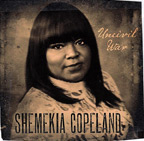 Shemekia Copeland
Shemekia Copeland
Uncivil War
Alligator Records 2020
As of this writing, chanteuse Shemekia Copeland, already blues royalty, is nominated for five of the Blues Foundation’s 2021 Blues Music Awards: Album and Contemporary Album of the Year, Song of the Year, Contemporary Blues Female Artist, and B.B. King Entertainer of the Year. She already has enough awards to fill a bookcase, but her latest release is deserving of the attention it has garnered.
Propelling Shemekia’s powerful and insistent vocals are her habitual collaborators: Pete Abbott on drums, Lex Price on bass, and guitarist Will Kimbrough, who also composed or co-wrote seven of the dozen songs. Illustrious guests include dobro and lap steel master Jerry Douglas, mandolinist Sam Bush, and guitarists Duane Eddy, Steve Cropper, and “Kingfish” Ingram. Unlike in her last two releases, no harmonica or horns are heard, and keyboards appear infrequently.
Instrumentation may be pared down, but messages emerge loud and clear. Copeland has consistently been an outspoken feminist and supporter of Black rights, and “Uncivil War” presents her in her most assertive mode yet, taking her place alongside Mavis Staples. The set opens with “Clotilda’s on Fire,” about the ostensibly last slave ship to arrive in the U.S. (in 1859), Kimbrough and Jason Isbell propelling the song with their interlaced guitars. It’s followed by ‘Walk Until I Ride,” an angry denunciation of racial profiling with a soulful gospel vibe replete with backing singers, and then the title song (the BMA nominee), a plea for tolerance and unity.
Somewhat shifting gears, the set advances to “Money Makes You Ugly,” a rocking denunciation of blind pursuit of the almighty dollar, this time driven by the entwined guitars of Kimbrough and Ingram. “Dirty Saint” is an affectionate tribute to the late Dr. John (Mac Rebennak), who was Copeland’s collaborator on her 2002 album “Talking to Strangers”; the lyrics limn the Dr. in all his flawed humanity. Then comes a woman’s version of the early Rolling Stones’ song “Under My Thumb,” reversing its paternalism and assumed male privilege.
Returning to the theme of U.S. cultural devolution is “Apple Pie and a .45,” a hybrid of rap and talking blues, declaring that violence is quintessentially American, widespread… and obscene. “Give God the Blues” avers that all of us, regardless of political affiliation, are pursuing a self-defeating course, and “She Don’t Wear Pink” amusingly rejects the objectification and infantilization often suffered by women. Abetted by Douglas’ lap steel, the animated “No Heart at All” castigates a former lover: “You’re not cold-hearted/You got no heart at all.” Ouch!
The stellar set ends with two covers. “In the Dark,” by Don Robey and Herman Parker, is a doleful lament for an unfaithful lover, its slow pace allowing Shemekia to provide her most moving vocal of the album…until the final track, that is, when she covers “Love Song,” penned by her late father, acclaimed Johnny Clyde Copeland. It’s an apt conclusion to the latest album from Copeland, whom many consider the reigning “Queen of the Blues.”—Steve Daniels
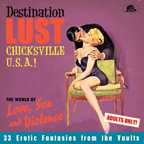 Destination Lust: Chicksville U.S.A.!
Destination Lust: Chicksville U.S.A.!
Various Artists
Bear Family CD
Welcome, once again, to the rarefied air of Chicksville U.S.A.! Volume Two presents 33 “historically erotic” jewels or, dare I say “pleasurable items” from the 1950s and 1960s. Both period “bombshells” are here, Marilyn Monroe and Jayne Mansfield, on the irresistibly earnest “I Wanna Be Loved By You” and “Too Hot To Handle” respectively, along with a distinguished variety of period night club and jazz singers—from Kay Martin & Her Bodyguards (“Fever”), Dorothy Collins (“Let’s Do It”), cabaret chanteuse Ruth Wallis (“Man, It’s A Jungle”) to Jeri Southern (“Senor Blues”), West Coast R&B singer Mabel Scott (“Yes”), Betty Dickson (“Shanty Tramp”) and Dinah Washington with her leering homage to her “Big Long Slidin’ Thing.” A few burlesque instrumentals spice things up further—from Barney Kessel’s hypnotic “Honey Rock” and the Upsetters’ (Little Richard’s backing band) “The Strip” to Big Jay McNeely’s raucously honking titty-shaker “Man Eater” and the Ken Kash Kwintet with their novelty “The Dig.” A set-closing highlight features the UK-based Peter Jay and the Jaywalkers who take us back to the halcyon days of the Parisian Folies Bergere with their rendition of the legs-kicking-high French “Can Can.” Comes with incisive annotations for each song along with a slew of period images and illustrations in an informative 16-page booklet. The “cat’s meow” as they used to say.—Gary von Tersch
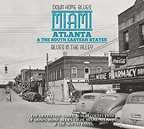 Down Home Blues: Blues In The Alley
Down Home Blues: Blues In The Alley
Miami, Atlanta & The South Eastern States
Wienerworld 3-CD Set
This is, count ‘em, the fifth box set in Wienerworld’s visionary Down Home Blues series that has been scholarly exploring representative regions of the black American blues scene. Earlier box sets focused on Detroit, Chicago (two volumes) and New York while this three CD set features 29 artists that were instrumental in furthering and developing the various traditions of the blues in Miami, Atlanta and various southeastern states—with down home sounds that range from the talented rack harmonica player, Frank Edwards, who recorded in the 1940s, to the sharp 1960s amplified harmonica work of Willie Brown. Included is a 78-page booklet on the terrene that engendered the music by esteemed blues researcher, Chris Bentley, along with a plethora of rare period photographs, an extensive gallery of 78 and 45 label shots and a full sessionography. While the focus is on little known musicians there’s also early sides by the likes of Ray Charles (a pair from 1951 before he moved to the West Coast), Earl Hooker (5 nifty, trance-inducing instrumentals and a great cover of Robert Nighthawk’s “Sweet Angel”), Jerry McCain (with five pre-Excello and Jewel numbers including “Crazy ‘Bout That Mess” and “She’s Tough”) and the duo of Curley Weaver and Blind Willie McTell on a trio of songs, notably “Brown Skin Woman” and “I Keep On Drinkin’.” It’s the lesser-known performers, however, that add profundity and passionate regard to this project. Artists that particularly caught my ear include Jimmy Wilson (whose “Tin Pan Alley,’ with its tough tale of “cuttin’ and shootin’ when the sun goes down,” made it to number 10 on the Billboard R&B chart); Clifford King (whose reworking of Amos Milburn’s “Chicken Shack Boogie” as, basically, a harmonica instrumental, is spellbinding), the mysterious Marylin “The Carolina Blues Girl” Scott, who, backed by the Johnny Otis Orchestra, rocks the joint on “Beer Bottle Boogie” and Charlie Harding, who amazes with his autobiographical “Train Porter Blues” and “Peach Tree Blues” that nods to his own Peach Tree state, although there’s nary a clunker in the bunch. A tip-top shelf endeavor that aurally traces how the blues in the South-Eastern states evolved during little more than a decade from 1949 through 1961.—Gary von Tersch
 Ghalia Volt
Ghalia Volt
One Woman Band
Ruf Records 2021
This is the third release by Ghalia Vauthier, born in Belgium but now ensconced in the southern U.S. where her heart apparently lies. Her first album, 2017’s “Let the Demons Out,” was strongly influenced by the musical heritage of New Orleans. Two years later her tastes took her slightly east to the Mississippi hill country, with its tradition of blues steeped in rhythm and repetition. The resulting album, “Mississippi Blend,” presented Ghalia in collaboration with regional luminaries: Cedric Burnside, Lightnin’ Malcolm, Watermelon Slim, and Cody Dickinson.
“One Woman Band” showcases Ghalia in the radically stripped-down format of soloist as she charges through eleven tunes, nine of which are originals. It’s not by accident that she has adopted the moniker ‘Volt’: the power cord is plugged in and there is no shortage of wattage as she belts out her sultry and peppery vocals. For some, those vocals may seem a tad mannered, but most listeners, I suspect, will instead be charmed and moved.
Most likely to appreciate this set are those fond of the aforementioned hill country blues, since most of the tracks adhere to that tradition. Melody and catchy hooks are mostly lacking. The tracks were recorded without overdubbing, so the drumming provided by Volt, courtesy of both feet, is sturdy but lacking in variation and propulsive turnarounds. Her guitar artistry compensates; she is adept at slide as well as straight electric six-string. A prime example is “Can’t Escape,” the set’s longest tune, with some runs of single notes but mostly a dependence on crunchy chords.
Among the other notable tracks is a cover of Tampa Red’s “It Hurts Me Too,” also memorably done by legendary slide guitarist Elmore James. On “Espiritu Papago” Volt is accompanied on bass by Dean Zucchero, and expert guitarist Monster Mike Welch joins on “Evil Thoughts.” The two guests then collaborate with Volt on the closing track, “Just One More Time.” It’s a danceable rocker proving that Volt can shine in a band setting as well as solo.—Steve Daniels
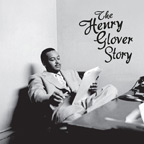 Henry Glover
Henry Glover
The Henry Glover Story
Rhythm And Blues Records
All purpose producer, arranger, songwriter, publisher, talent scout, singer, A&R man, trumpet player, studio constructor, engineer and label owner Henry Glover was one of the most multi-talented music industry movers, shakers and entrepreneurs of the mid-20th century. Quite a mouthful I’m aware, but it’s all on display on this marvelous 4-CD set from Nick Duckett’s enterprising Rhythm & Blues Records label. As Duckett opines at the outset of his detail-rich, well researched liners: “The fact that he was black and working in an exclusively white executive environment makes his achievements all the more remarkable.” This engaging retrospective project, actually, shines the spotlight solely on his songwriting—of the 123 tracks here all but one was written or co-written by the multi-talented Glover, who early on developed a reputation for his risque and drinking songs. And we’re talking radio and jukebox hits like “Blues Stay Away From Me,” “Annie Had A Baby,” Honky Tonk,” “It Ain’t The Meat (It’s The Motion),” “Let The Little Girl Dance, “Peppermint Twist,” “I Want A Bowlegged Woman,” “I Like My Baby’s Pudding,” “Sticks And Stones” and “Seven Nights To Rock,” to cite only a few. Between 1947 and 1964, thirty-four of his songs (mostly on the King group of labels) featured on the Billboard R&B charts—an achievement exceeded only by Leiber and Stoller’s fifty-six. Artists featured include the likes of Bull Moose Jackson and his Buffalo Bearcats, Hank Ballard and the Midnighters, Wynonie Harris, Roy Brown, Little Willie John, Bill Doggett, the 5 Royales, Little Esther, Champion Jack Dupree and Ray Charles as well as country artists like Moon Mullican, Hawkshaw Hawkins, the York Brothers and the Delmore Brothers. Congrats to Duckett for pulling it all together so admirably—a must-buy by any measure.—Gary von Tersch
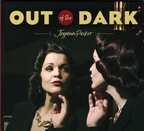 Joyann Parker
Joyann Parker
Out of the Dark
Hopeless Romantic Records 2021
Based in Minneapolis, Joyann Parker is a quintuple threat: songwriter, producer, guitarist, pianist, and above all, singer. Her sophomore effort is a veritable barnburner.
The eleven songs on the album were co-written by Parker and fellow guitarist Mark Lamoine, who also co-produced. All sport catchy lyrics and hooks as they sample a gamut of sub-genres: jazz, soul, gospel, rock, and of course blues. Each track radiates heat, at either a simmer or a boil. The rhythm section of drummer Bill Golden, bassist Bard Schaefer, and keyboard artist Tim Wick is a sturdy and often sizzling foundation, and several tunes are augmented by horns and backing singers. Lamoine’s guitar stylings are animated and creative without stealing the show.
The star is Parker, whose bold and brassy vocals place her in the upper echelon of contemporary women power vocalists who can convey emotion convincingly. Perhaps the most impressive qualities of her singing are her sheer force, her ability to glide smoothly between low to high notes, and her capacity to sustain a single pure note without warble or trill. Since I lauded her previous album, 2018’s “Hard to Love,” her already top-notch command of her voice has even increased.
The initial triad of tracks stay in a mid-tempo mode. “Gone So Long,” the minor key opener, and “Carry On” (not a cover of the Crosby, Stills, and Nash song; all songs here are originals) mine a gospel vibe, the latter accentuated by dual guitars, a female backing vocal duo, and a few a cappella middle bars, all propelled by some dazzling drum work. “Bad Version of Myself” follows, with Rory Hoffman making his only appearance on harmonica and Parker vocally sounding much like Susan Tedeschi. Nice piano (by Parker or Wick) introduces the pop-rock “What Did You Expect,” and “Either Way” allows for some zesty slide guitar by Paul Mayasich, while here Parker’s singing evokes memory of Bonnie Raitt.
Already cooking, the set now hits an even higher gear. “Predator” is a cautionary tale about deceitful men, a shuffle with trumpet fills and even a hint of Latino flavor. “Dirty Rotten Guy,” its successor, presents the counter-intuitive advice to actually search out a cad for some pleasure, and is bolstered by trombone lending a New Orleans touch. The next three tracks are rockers, with irresistible drive; by the third, “Hit Me Like a Train,” there should be no debate that this woman and this band can rock with the best. The set modulates to a conclusion with the title tune, an introspective number with strings, backing vocalists, and Parker on piano.
It’s early in the year, but Joyann Parker, already a nominee for regional and national awards, is sure to be in the running for more accolades.—Steve Daniels
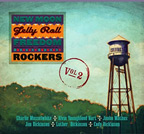 New Moon Jelly Roll Freedom Rockers
New Moon Jelly Roll Freedom Rockers
Volume Two
Stony Plain CD
This is the second volume of circa 2007 jam-session music from the inspired roots music “super group” consisting of Charlie Musselwhite, Jimbo Mathus, Alvin Youngblood Hart and the late Jim Dickinson along with North Mississippi All Stars members Luther and Cody Dickinson—who, incidentally, were just nominated for a Grammy in the contemporary blues category for their recent Up And Rolling album. The repertoire here is a very appealing mix of uninhibited takes on such classics as Doug Sahm’s “She’s About A Mover,” Junior Wells’ “Messing With The Kid,” Charles Mingus’ “Oh Lord, Don’t Let Them Drop That Atomic Bomb On Me” and Jimmy Reed’s “Can’t Stand To See You Go” (featuring Hart on “Mover” and Jim Dickinson on the following three) alongside a panoply of originals by the participants. Highlights among the latter feature a pair by first generation psychedelic blues warrior Musselwhite (an easy rocking “Blues For Yesterday” when “times were tough but we had fun” and the bleak “Black Water”) as well as a pair by Mathus (“Searchlight” with the line “I searched for you baby with my searchlight all over town” and the risque “Greens and Ham”) and Hart’s country blues commentary “Millionaire Blues.” The last word remains Jim Dickinson’s: “The South is haunted. The air hangs heavy with ghosts. Sing the phantom song. Let the music become a magic current, a path from the holy past to the unknowable future.” Amen.—Gary von Tersch
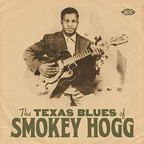 Smokey Hogg
Smokey Hogg
The Texas Blues Of Smokey Hogg
Ace CD
Born in Glenfawn, Rusk County, Texas in 1914, Andrew “Smokey” Hogg began his illustrious career as a teenager when he teamed up with the idiosyncratic slide guitarist B.K. Turner (aka the Black Ace), traveling together and playing a rural circuit of East Texas logging and turpentine enclaves, deep country dance halls and juke joints and, along the way, making his first recordings for Decca in 1937. A lot of wandering ensued and by 1947 he was based on the West Coast and, for the next decade, recorded quite extensively for a slew of West Coast indie labels, including Meteor, Combo, Ebb, Ray’s, Exclusive, Jade, Recorded in Hollywood, Imperial, Federal, Specialty and Modern. This thoughtfully compiled CD, with a welcome chronological running order (great move) has, as far as possible, been put together to avoid duplication with previous legitimate CD offerings and features, as well, fully thirteen numbers that derive from 78’s and 45’s that have never been issued before as well as four tracks unissued in any form previously. From the opening track about a man who is losing his girlfriend to a fellow who has a Cadillac Eight when he only has a V-8 Ford (“I Don’t Want You”) to the closing song about mortality, titled “Too Late Old Man,” there’s nary a clunker in the bunch. Creatively re-arranged and reworked covers reveal the depth of Smokey’s talent and also led to his biggest hit with a personalized version of Sonny Boy Williamson’s “Good Morning School Girl” reaching # 5 on the Billboard R&B charts in 1950. He also works his blues magic with inventive covers of titles by Leroy Carr (“When The Sun Goes Down”) and Big Bill Broonzy (“Baby Shake Your Leg”) as well as the fore-mentioned “Too Late Old Man”—a Washboard Sam-informed recall of James “Beale Street” Clark’s “You Can’t Make The Grade.” Also noted is his expressive two-part “Penitentiary Blues,” that vividly recalls the horrors of the Texas prison system. This is Ace’s fifth Smokey Hogg CD and is an alert tie-in to Guido van Rijn’s just-out book of the same title that features the Texas bluesman’s biography, transcriptions and analysis of his, count ‘em, 256 recordings as well as a wealth of rare photos and over 200 label shots. Long live Smokey Hogg!—Gary von Tersch
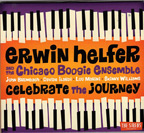 Erwin Helfer and the Chicago Boogie Ensemble
Erwin Helfer and the Chicago Boogie Ensemble
Celebrate the Journey
The Sirens Records 2021
The list of notable Chicago blues pianists is not only long, it is mind-boggling. Think Roosevelt Sykes, Big Maceo Merriweather, Pinetop Perkins, Otis Spann, Memphis Slim, Jimmy Walker, Jimmy Yancey, and more recently Barrelhouse Chuck and Johnny Iguana (to name only some). In relation to this new album also think Speckled Red, Cripple Clarence Lofton, and Sunnyland Slim, because they are a few of the keyboard heavyweights whom Erwin Helfer knew in his youth and who mentored him.
Helfer turned 85 this January. Widely recognized as a jazz and blues expert on the 88s, Helfer has released multiple albums, including ten in the last couple of decades on The Sirens label, and has appeared on innumerable others. In honor of his long and luminous musical path, Helfer and his long-time bandmates got together for this instrumental set, and in the process proved that Helfer has ceded nothing to age.
Colleagues Lou Marini on bass, Davide Ilardi on drums, and Skinny Williams and John Brumbach on tenor saxophones join Helfer on eight tunes, comprising close to an hour of superb music, essentially jazz but bluesy to its core. The vibe ranges from languorous and ethereal to jaunty. At this point in his career, Helfer has every right to flaunt his expertise, but instead, as he is wont to do, he blends seamlessly into this skilled ensemble. Everyone gets some solos, all fine, but nobody hogs the spotlight.
The nearly hour long set sports three original Helfer compositions, including the longest, “Big Joe,” a beautiful track of over eight minutes that inspires revery. Even the shortest cut, “Day Dreaming,” clocks in at over four minutes in closing the album; it’s Helfer alone with his piano in another sublime piece. For those seeking more up-tempo verve, there are “Doxy,” a Sonny Rollins tune; “Alexander’s Ragtime Band” by Irving Berlin, and a rollicking version of the traditional “Down by the Riverside.”
Smack in the middle of the set there is even a rendition of the hoary “St. James Infirmary.” That song has been covered by literally hundreds, if not thousands of performers; I have at least fifteen of my favorite versions saved. Well, a great song never grows old; this Chicago Boogie Ensemble track is now also in my music library.
Erwin deserves acclaim for his longevity, durability, and superb musicianship. Long may he persist.—Steve Daniels
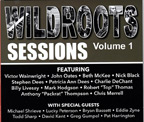 The Wild Roots
The Wild Roots
WildRoots Sessions Volume 1
WildRoots Records 2021
In 2016 the Wild Roots won the Blues Foundation’s Blues Music Award for Band of the Year; its keyboard player and vocalist, Victor Wainwright, has been nominated nine times for a BMA, and has won five times as Pinetop Perkins Piano Player of the Year. Yet this is not a release of the band as currently composed, nor of Wainwright. Instead, it is a retrospective of the band’s fifteen years together. It is comprised of sixteen tracks, lasting well over a full hour, featuring past members of the group and assorted guests.
Presently, the Wild Roots are Wainwright along with long-time bandmates Stephen Dees and Patricia Ann Dees. Each Dees is a multi-instrumentalist, with Patricia adept on flute, saxophone, and bass, and Stephen on guitar, bass, and percussion. All three can sing well, and individually or in cooperation have composed about half of the tracks. Accompanying them in the rotating cast of guests and former bandmates are twenty-nine musicians in addition to the basic trio. Yes, they somehow all get acknowledged in the liner notes.
Somewhat surprisingly, Wainwright’s mastery of piano and organ is not the focus of the collection, and on most tunes even the standard center of contemporary blues ensembles, the guitar, takes a back seat. There are some pithy, and a few dazzling solos guitar solos, but if anything it’s the horns that are front and center. Kudos to Patricia Dees and her fellow saxophonist Charlie DeChant (and Ray Guiser on one cut) for stellar work. Patricia also deals out some groovy flute renderings on “Memphis Queen,” which features Nick Black on vocal and slide guitar. Stephen Kampa provides apt harmonica frills and solos on five tracks, and the lately deceased Lucky Peterson plays organ on “In a Sad Room.”
Complementing the instrumentation with horn emphasis is the other focus of the set, the vocals. Of the myriad singers, perhaps only the name John Oates (of Hall and Oates) will be readily recognized, but all the singers acquit themselves admirably through the eclectic collection of slow, mid-tempo, and rocking cuts. It’s hard to cite just one, but I particularly liked Mark Hodgson’s singing on “Misty Morning in New Orleans.” Mention of Stephen Dees’ bass playing is also merited. The accomplished mixing and mastering of these tracks allows for ample appreciation of his worthy rhythmic support.
This journey through the history of the Wild Roots is worth repeated listening.—Steve Daniels
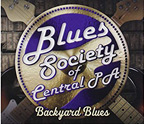 The Blues Society Of Central Pa
The Blues Society Of Central Pa
Backyard Blues
CD
Various
Blue Heart Records
Fittingly titled, Backyard Blues is a heady gathering of 16 original songs in a variety of blues-derived styles written and performed by Central Pennsylvania musicians, with three bonus tracks available via digital release only. Developing from the camaraderie and musical collusions cultivated by a weekly BSCP-hosted blues jam held every Thursday evening for more than 20 years this fascinating collection of original music exhibits the diverse directions, attitudes and shades of the blues. Most of the bands have a pair of tunes—blues rocking Buzzard Luck shines on the dynamic wailer “Keyhole” and a throbbing “True Force Of Nature” while the high-spirited Barrelhouse combo keeps up a solid, harp-spiced blues groove behind sultry vocalist Rose Hudson on both “Outside Cat” and “The Blues Will Burn Ya” as the rootsy Nate Myers Trio shifts from his visionary recall of the traditional “Catfish Blues” into some autobiographical Windy City nostalgia on the lengthy “Catfish Blues/It’s My Music” as well as on the slow-paced, atmospheric “Is That What You Want?” The Mighty Klucks also impress with both the instrumental workout “C Jam” and a call for “More Whiskey” and, likewise, Rocky & The House Band with both the soulful ballad “Since We’ve Been Apart” and the easy rocking “Ball And Chain.” Also noted is Roger Hammer’s contemplative “Walkin’ Round Blues” and, on the digital side, Crooked Eye Tommy’s “Hot Coffee & Pain.” Lots of ear-catching sound—Gary von Tersch
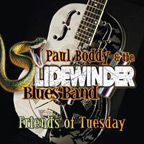 Paul Boddy & The Slidewinder Blues Band
Paul Boddy & The Slidewinder Blues Band
Friends of Tuesday
www.slidewinderbluesband.com
Paul Boddy (guitar/lead vocals), Glenn Hale (keyboards), Chuck Hearne (bass guitar), Jim Bowman (drums) and Lori Gaston (backing vocals) formed this band at a local pub in their Doylestown, Pennsylvania area. According to the liner notes they got together for the purpose of hosting a weekly open blues jam at a place called The Puck Restaurant. There is a tightness and camaraderie that you get from providing that kind of service to the community, if you will, on a regular basis. And that comes through loud and clear on this album.
All the tunes were written by Paul Boddy, beginning with the funky and humor-laden “Over the Hump.” With references to Forrest Gump and other clever wordplay, Boddy sings about aging and not moving as spryly as one used to. But it’s all done tongue-in-cheek and with some fire in the groove. Snappy guitar and Hale’s whimsical organ comps make this a stellar dance track. “Love Me Darlin’” follows and is a jazzy swinging tune. Rich backing vocals from Gaston give this cut exceptional spark. Boddy’s stinging guitar work blends nicely with flowing organ swells and runs. And the message is clear, “Love me darlin’ or please leave me alone!” “Money on Love” is the perfect working-class bar band kind of song. Essentially the premise is about working hard and playing hard, with the hook, “Time to go out drinking and spend some money on love.” Boddy plays some sweet slide here over a New Orleans-type boogie beat. It’s a very spirited and upbeat tune that should get one on their feet. “Knock My Boots” is another comically-worded piece that’ll make you smile while it gets you on the dance floor. The chorus resolves with “You can laugh at my pants….You can shame my shirt, but don’t you knock my boots!” See what he did there? Boddy slays with killer slide as the band is joined by guest saxophonist Tim Shay. “Pretty Kitty” features guest harmonica player Mikey Jr. who adds some greasy funk to this fun and slightly naughty jazz-type tune. Double entendres abound as Hale burns on some Jimmy Smith meets Jack McDuff-type organ riffs. “Makin’ Me Cry” concludes this disc and is one of the strongest songs here. It’s a powerful ballad, with heartfelt vocals and stellar backups from guests Jeannie and Carol Brooks. This has radio potential and crossover appeal written all over it, with Boddy’s wailing guitar and Clapton-like demeanor.
“Friends of Tuesday” by Paul Boddy and The Slidewinder Blues Band is a fun and enjoyable ride. They create a live and vibrant energy that translates really well on record. —Eric Harabadian
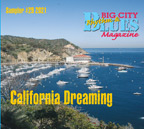 California Dreaming
California Dreaming
Big City Rhythm & Blues Sampler #29 2021 Assorted Artists
bigcitybluesmag.com
Those who are avid subscribers of this magazine are well aware of the fine samplers of music artists featured regularly in each issue. Well, in honor of 26 years of publishing Big City Rhythm & Blues magazine, here is a smorgasbord of some of the latest and greatest to be featured in these esteemed pages.
Running down the track list, Hurricane Ruth is here, with “What You Never Had.” It’s an upbeat and joyful juke joint-inspired swinging blues tune. Smoking guitar and Hammond B3 abound as Ruth sings “Why worry about what you never had, life’s about living, not what you have.” Sage advice from a great singer! Little Freddie King, with special guest Tino Gross, are captured live on the cut “Trip to Detroit.” This percolates with a Bo Diddley/John Lee Hooker kind of energy. As lead vocalist and hype man, Tino engages some raw and sizzling lead guitar from King. It’s a fun and raving free-for-all. With a warm and mellifluous delivery, Cathy Grier sings a song about female empowerment called “I’m All Burn.” It’s a fierce and penetrating mix of old school Memphis soul and modern #Me Too awareness. Favorite Detroit son Pat Smillie sings a clever and self-effacing original called “Broke Down Chevy #2.” He delivers this light-hearted and soulful track with Joe Cocker-like grit. The old adage “behind every man there is a good woman” holds true as Smillie sings “I was a broke down Chevy till she loved me like a Cadillac.” Another Detroit mainstay, Luther “Badman” Keith, is represented here with a song called “Blame Game.” Ripped from today’s headlines, it addresses gun violence and man’s inhumanity to man. It’s a powerful piece featuring Keith’s impassioned vocals and searing guitar work. Geminii Dragon performs a cut called “Like it Or Not.” This has a real voodoo-like vibe. From the soulful vocals to the eerie guitar backdrop, it’s a hypnotic and trance-inducing piece. Tony O is here with “Blues O Blues.” Tony’s smooth vocals blend nicely, with the BB King/Johnnie Bassett-like guitar fills and a big Joe Williams/Bobby Bland-type arrangement. Mojo Morganfield’s “It’s Good to Be King” is entertaining and funny. It’s an uptempo Chicago burner that doesn’t take itself too seriously. The Paz!Man Super Session performs “Todos Son Todo (Everybody is Everything).” Mark Pazman leads the pack here, with a cool Latin number in the vein of classic Santana or Malo. It has great hooks and strong radio potential. Emma Wilson does a really nice job on Aretha’s “Dr. Feelgood.” It’s basically a piano and vocal piece where she totally breaks it down and tears it up. Chicago keyboardist Johnny Iguana is a blues revivalist, of sorts, and puts a vintage stamp on a tune called “You’re an Old Lady.” It’s kind of a rave up in a Jerry Lee Lewis kind of style. Strong vocals and guitar are here as well. Ed Jackson’s Time Out makes an appearance on the sampler, with a straight-ahead blues rocker called “Drunk.” It’s kind of a raw hybrid blend of something like the Stray Cats meets Robert Gordon. Bees Deluxe offers a strange one called “Voodoo Doll.” It’s kind of a psychedelic and spacey thing, with odd lyrics and cool reverb-drenched guitar. “This Crazy World” by Roger “Hurricane” Wilson is a live cut that really swings. It’s raw and has that intimate club feel. The production is a tad lo-fi, but, perhaps, that adds to its charm. The Lizzard Kings follow, with “Curve Appeal.” The tune is kind of a bluesy version of The Commodore’s “Brick House.” It’s a sexy, smooth and novel number. It’s funky and it swings, with clever lyrics and smokin’ sax and keys. Rose Carver does a really nice job on John Prine’s “Angel From Montgomery.” It’s a respectful stripped down version of the country/folk classic. Perhaps, one of the most daring and progressive tracks in this collection is the instrumental “Jack Ham Her” by guitarist Dave Fields. It’s got a real Jeff Beck rock-fusion feel, with heavy syncopation and pyrotechnic axe play.
Overall, this is a great sampler of some of the best independent blues and R&B related music on the global scene today. So, take a moment and add some new blues and soul to your personal daily regimen.—Eric Harabadian
BOOK
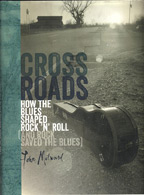 Crossroads: How the Blues Shaped Rock ‘n’Roll (and Rock Saved the Blues)
Crossroads: How the Blues Shaped Rock ‘n’Roll (and Rock Saved the Blues)
By John Milward
Northeastern University Press 2013
Famously, Muddy Waters declared “the blues had a baby and called it rock-and-roll.” (Or maybe it was Willie Dixon; the jury is out.) This truism was demonstrated to me, convincingly, several years ago when contemporary bluesman Fruteland Jackson visited Santa Barbara for a day of Blues for Youth in the public schools. Strumming his guitar, Jackson informed the students, “This is blues.” He continued playing the identical riffs, steadily increased the tempo, and in thirty seconds declared “This is rock-and roll”…and it was.
It took me a few years to get to this book, but I enjoyed it. Right in the preface of Crossroads John Milward announces his intentions: This is “a history of connections between blues musicians, folk singers, and rockers…neither an encyclopedic history of the blues, nor a full accounting of the blues-rock universe….” Based on extensive research and myriad personal interviews, Milward presents an entertaining litany of anecdotes centered on famed rock musicians and the bluesmen that most influenced them.
Note: bluesmen. The distaff side of both the blues and rock genres is almost totally ignored. Bessie Smith is mentioned once in passing, on page 2, and Sister Rosetta Tharpe once on page 125; there is no mention of Ma Rainey, Ida Cox, Memphis Minnie, Big Maybelle, or any of the other myriad women pioneers of blues and progenitors of rock. Likewise, aside from Bonnie Raitt and a few nods to Rory Block, women in rock and contemporary blues are virtually totally ignored. On the racial side, Black rock pioneers, other than Chuck Berry, garner little ink, and of those rockers who have been influenced by blues, other than Jimi Hendrix all those discussed are white.
Milward does expatiate on such seminal bluesmen as Mississippi John Hurt, Son House, Reverend Gary Davis, and especially Robert Johnson. In doing so, he alludes to “the finely wrought songs that appealed to generations of blues-rock musicians …[and] the allure of the crossroads myth.” Yet there is scant analysis of the nature and inherent appeal of blues, and none of the basic twelve-bar format that has made blues so amenable to morphing into rock: a stable structure allowing for endless inventiveness within it.
Glaringly, there is nary a mention of blues as the basis of rap, hip hop, and much of folk music, jazz, and pop music. Sure, it’s a book about rock, but….
On the positive side, the book is replete with brief biographies of bluesmen and rockers, and fascinating stories of recording sessions, chance meetings that led to fruitful collaborations, juicy contractual disputes, and personal relationships of both affection and antagonism. There are some mind-boggling revelations. For example, from Eric Clapton: “In my early teens, I wasn’t sure about what was white and what was black: it all seemed two sides of the same coin. I didn’t know Chuck Berry was black. I thought he was another weird-sounding white man. I had no idea there was a racial thing involved.” Wow! At least Clapton learned quickly, and has always given his Black blues predecessors their proper due.—Steve Daniels
Home
/ Blues Blogs /
Artist Links / Blues
Links / Videos / Store
Subscribe / Advertise
/ Back Issues
/ Contact / Staff